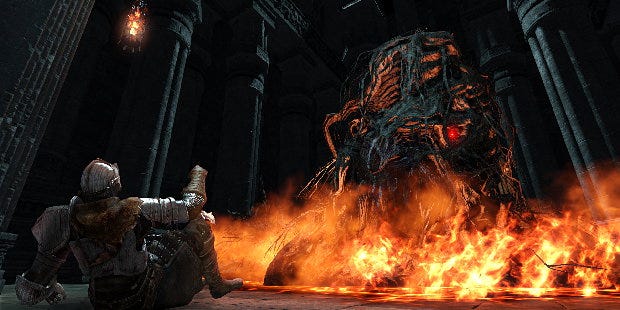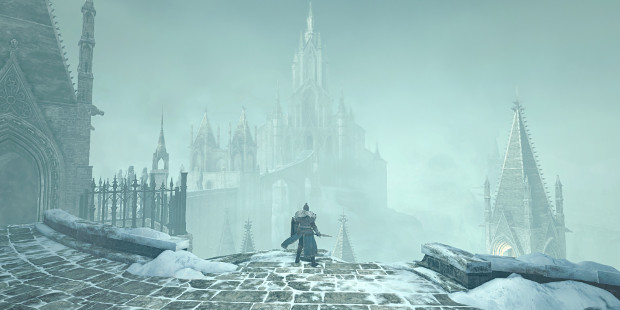Why I Think Dark Souls II Is Better Than The Original
Roll with it
It'll take a great deal of analysis to figure out how exactly Dark Souls III [official site] fits into the wider mythology of the series in terms of its tremendous, cryptic lore, and it might take even longer for critical opinion to decide where it ranks in the pantheon of Souls games. But we can all agree on one thing, right? Dark Souls is superior to its first sequel in almost every way.
Not Michael Johnson. Here, he argues that Dark Souls II changes and improves on the formula set by its predecessor and that it has the greatest expansions in all of gaming.
There's a popular notion that Dark Souls is a modern masterpiece, yet it's sequel - though well received initially - isn't even close to reaching the same soaring critical heights as its predecessor. If you're examining the two games based on the cohesion of its assorted places, the way they're connected and the wondrous sights along the way then that notion would be correct. Dark Souls feels like you've been dropped in a queasy, vicious nightmare, while Dark Souls 2 feels like you're in a 'gameworld' - a collection of levels strung together in an altogether more linear fashion.
Similarly, the Bell-ringing and 'Four Grand Souls' design of Dark Souls means that the boss fights are tied more deeply to the central goals of the game - there is a feeling of an event in one part of the world being attached to a grand design. In Dark Souls 2 you merely have to kill enough dudes to pass a gate, so you can go and kill some bigger dudes in a castle and the lands beyond it.
But the secret of Dark Souls is that actually once that grand journey is over, a second begins – the path of mastery - and Dark Souls 2 is far far better at this. For many who play Souls games, that first adventure is enough, they play to exhaustion, dragging themselves over the finish line and reflect on what they've been through. For others, that's merely the start, returning to new game plus, repeating the game with a new focus, forewarned and pre-armed with knowledge.
Dark Souls has all of this yet it works far better as a first-time experience. Dark Souls 2's Drangleic is meant to be lived in beyond that with an expanded scope, re-mixed enemy placements and a deeper focus on the Covenants where you can become invader or saviour (and PvP that actually works).
In his Wot I Think of Dark Souls 3, Adam touched upon the idea that as you die and die and die in an area you learn the nuance, transforming from a tip-toeing, shield raised scaredy-cat into a pseudo-psychic bringer of doom. Yet Dark Souls, in contrast to its sequel, is chock full of cheap tricks where your knowledge of the game can't really help you. Instead, at times you rely on luck, the AI making terrible decisions, or worse yet your ability to complete a dangerous jump. These moments are well-known by veteran players, but can still cause intense frustration. Key offenders are the entirety of Blight Town, the arrow-bastards of Anor Londo and the Bed of twatting Chaos (as you can see I am highly creative at giving my primary antagonists appropriate nicknames).
Bed of Chaos is a brilliant conceit for a boss – a tiny enfeebled creature guarded by a living tree (tree-bastard), punching into recurring concepts of smoke and mirrors and withering decay. To defeat the Bed of Chaos you simply need to destroy two roots at either side of the chamber, and jump over a newly formed chasm to reach the feeble pygmy encased within the oak. But 'that' jump. Oh man 'that' jump. I once failed 'that' jump 16 times in a row and I very nearly graduated from the light thigh slap I usually resort to in moments of Souls' annoyance to full on controller dismantling apoplectic rage.
When Dark Souls asks you to step away from the wonderful combat and engage in some light platforming the whole experience damn near falls apart. After 16 attempts I could feel my blood pumping furiously through newly protruding veins, knowing that once more I must endure the arduous journey through the lava and back to the fight. There's no moment of jaw-gnashing frustration like this in Dark Souls 2, and it means I know going into a play-through that the only roadblocks are skill-based ones. If I can 'git gud', in the popular souls parlance, then luck doesn't enter the equation. Of course it's arguable that timing a jump is a skill too – but it's essentially an unrewarding one, successfully completing a dangerous jump brings a sense of relief rather than any real achievement.
Let's talk about equipment. Fashion Souls is obviously a thing, tapping up the true hardcore Souls player's desire to dress up little dolls to make them look pretty. But one of the key elements that separates the two Souls games is choice.
The variety of ways in which you can build and equip your character in the second Dark Souls, without having to hamstring yourself, greatly outnumbers your options in the first. Duel-wielding in particular is a delight for veterans, boiling down the risk-reward essence of Dark Souls into a single mechanic - removing your shield is like taking off the training wheels. Dark Souls on the other hand has gear that is objectively superior and in some cases horribly overpowered. Havel's set – an ugly heavy suit of armour - essentially turns parts of the game into easy mode, with three relatively challenging encounters (Four Kings, Gwyn and Seath) transformed into a walk in the terribly decayed park. Souls veterans will also be well aware of the crutch and new-player trap known as the Drake Sword.
In Dark Souls it is of course possible to complete the game with terrible weapons and in your pants, but it always feels as though you're being pushed into making suboptimal choices if you want to express yourself through your character. In Dark Souls 2, there are more mechanics and more viable ways to play and fight, thanks to powerstance and with magic firmly broadened and rebalanced to support your choices.
The Souls games outright have the best DLC in games as far as I'm concerned. In the first Dark Souls we got an additional adventure, tacked on to the main game, where we delve into the story of Knight Artorias and descend the abyss for some of the best battles of the series. It's brilliant, but it is essentially a side-quest and all the complaints about Dark Souls 2's world building and lack of interconnectivity apply here too.
In Dark Souls 2, on the other hand, the DLC makes the very best use of that more modular approach with three distinct environments that reflect the creatures who inhabit them and vice-versa. They are masterworks of level design, packed full of traps, stunning sights, shortcuts and new enemies with the capacity to surprise and sunder. In terms of mastery the challenge routes of Dark Souls 2's DLC offer the ultimate test, with devious enemy placements, amped up boss fights and terrifying stealthy reindeer (reindeer-basta... you get the picture).
I love Dark Souls, it's everything those million think-pieces say it is - the product of a genius auteur, a beautiful decaying world of hardship, self-improvement and eventual triumph. But I love Dark Souls 2 just as much, because it takes the combat and it takes the skills I've learned and earned and it pushes them to the limit, while giving me the agency of choosing where I go and how I want to fight. My choices feel like my choices so much more. In Dark Souls 2 - I'm not just a Chosen Undead, I'm the Chosen Undead.
There is one final caveat though that almost tears my argument down – Dark Souls 2's boss battles, pre-DLC, are mediocre, almost without exception mediocre. While Dark Souls had its own clunkers such as Ceaseless Discharge, it had moments of brilliance that its sequel was unable to match.














